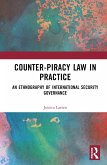Maritime Autonomous Vehicles and International Law
Maritime Security Perspectives
Herausgeber: Klein, Natalie; Mclaughlin, Rob; Karim, Md Saiful; Guilfoyle, Douglas
Maritime Autonomous Vehicles and International Law
Maritime Security Perspectives
Herausgeber: Klein, Natalie; Mclaughlin, Rob; Karim, Md Saiful; Guilfoyle, Douglas
- Gebundenes Buch
- Merkliste
- Auf die Merkliste
- Bewerten Bewerten
- Teilen
- Produkt teilen
- Produkterinnerung
- Produkterinnerung
Maritime Autonomous Vehicles have the potential to radically alter all uses of maritime space. This book explores the current international legal framework and the options available to regulate maritime security in the face of emerging technologies. It will be of interest to researchers of the law of the sea and maritime security.
Andere Kunden interessierten sich auch für
![Mobile Payments, Consumer Policy, and the Law Mobile Payments, Consumer Policy, and the Law]() Nwanneka V EzechukwuMobile Payments, Consumer Policy, and the Law183,99 €
Nwanneka V EzechukwuMobile Payments, Consumer Policy, and the Law183,99 €![Counter-Piracy Law in Practice Counter-Piracy Law in Practice]() Jessica LarsenCounter-Piracy Law in Practice183,99 €
Jessica LarsenCounter-Piracy Law in Practice183,99 €![Limitation of Liability for Maritime Claims: A Study of U.S. Law, Chinese Law and International Conventions Limitation of Liability for Maritime Claims: A Study of U.S. Law, Chinese Law and International Conventions]() Xia ChenLimitation of Liability for Maritime Claims: A Study of U.S. Law, Chinese Law and International Conventions163,99 €
Xia ChenLimitation of Liability for Maritime Claims: A Study of U.S. Law, Chinese Law and International Conventions163,99 €![Digitization, Copyright and the Law Digitization, Copyright and the Law]() Ettore M LombardiDigitization, Copyright and the Law217,99 €
Ettore M LombardiDigitization, Copyright and the Law217,99 €![Digital Health Technologies Digital Health Technologies]() Carolyn JohnstonDigital Health Technologies183,99 €
Carolyn JohnstonDigital Health Technologies183,99 €![National and International Water Law and Administration: Selected Writings National and International Water Law and Administration: Selected Writings]() Danta CaponeraNational and International Water Law and Administration: Selected Writings339,99 €
Danta CaponeraNational and International Water Law and Administration: Selected Writings339,99 €![The Law and Autonomous Vehicles The Law and Autonomous Vehicles]() Matthew ChannonThe Law and Autonomous Vehicles271,99 €
Matthew ChannonThe Law and Autonomous Vehicles271,99 €-
-
-
Maritime Autonomous Vehicles have the potential to radically alter all uses of maritime space. This book explores the current international legal framework and the options available to regulate maritime security in the face of emerging technologies. It will be of interest to researchers of the law of the sea and maritime security.
Hinweis: Dieser Artikel kann nur an eine deutsche Lieferadresse ausgeliefert werden.
Hinweis: Dieser Artikel kann nur an eine deutsche Lieferadresse ausgeliefert werden.
Produktdetails
- Produktdetails
- Verlag: Taylor & Francis
- Seitenzahl: 316
- Erscheinungstermin: 31. Dezember 2024
- Englisch
- Abmessung: 238mm x 159mm x 23mm
- Gewicht: 628g
- ISBN-13: 9781032675596
- ISBN-10: 1032675594
- Artikelnr.: 71706746
- Herstellerkennzeichnung
- Libri GmbH
- Europaallee 1
- 36244 Bad Hersfeld
- gpsr@libri.de
- Verlag: Taylor & Francis
- Seitenzahl: 316
- Erscheinungstermin: 31. Dezember 2024
- Englisch
- Abmessung: 238mm x 159mm x 23mm
- Gewicht: 628g
- ISBN-13: 9781032675596
- ISBN-10: 1032675594
- Artikelnr.: 71706746
- Herstellerkennzeichnung
- Libri GmbH
- Europaallee 1
- 36244 Bad Hersfeld
- gpsr@libri.de
Natalie Klein is Professor and Associate Dean (Academic) at UNSW Sydney's Faculty of Law & Justice, Australia. She is currently President of the Australian Branch of the International Law Association and one of Australia's nominees under Annex V and Annex VII of the UN Convention on the Law of the Sea. Her masters and doctorate in law were earned at Yale Law School, and she is Fellow of the Australian Academy of Law and of the Academy of the Social Sciences in Australia. Douglas Guilfoyle is Professor of International Law and Security at UNSW Canberra. His principal areas of research are the international law of the sea and international and transnational criminal law. Particular areas of specialism include maritime law enforcement, the law of naval warfare, international courts and tribunals and the history of international law. He is a 2022-2025 Australian Research Council Future Fellow. He was previously Professor of Law at Monash University and Reader in Law at the University College London. He was a Gates Cambridge Trust scholar and Chevening scholar during his graduate study at the University of Cambridge. Md Saiful Karim is Professor in the School of Law and Justice at the University of Southern Queensland (UniSQ). Professor Karim was McDougall Visiting Professor in International Law at West Virginia University. He was a consultant at the University of the South Pacific and a visiting research fellow at the National University of Singapore. He teaches and researches in various areas of ocean, human rights and environmental law. He has published extensively in the fields of ocean and environmental law and has presented research papers at several conferences and workshops in Asia, Europe, North America and Oceania. Rob McLaughlin is Professor of Law at the Australian National Centre for Ocean Resources and Security at the University of Wollongong, Honorary Professor at the Australian National University College of Law and Fellow of the Stockton Centre for International Law at the US Naval War College. Rob came to academia after a career in the Royal Australian Navy as a seaman officer and a legal officer.
Part I: Overarching Issues
1. Maritime Autonomous Vehicles: Challenges and Opportunities under
International Law
2. Integrating Maritime Autonomous Vehicles into National Maritime Security
Architecture
3. MASS, UNCLOS and the Flag State
Part II: Military Concerns, Military Activities and Navigational Rights
4. Sovereign Immunity of Unmanned Maritime Vehicles
5. Maritime Drones at War: Legal Issues Affecting Characterization and Use
6. The Future of Ocean Technology and Navigational Rights in the
International Law of the Sea
7. Some Rules Applicable to Use of Long Range Underwater Maritime
Autonomous Vehicles for Intelligence, Surveillance and Reconnaissance
Purposes
8. The Legality of Electromagnetic Interference with Maritime Autonomous
Vehicles
Part III: Responding to Illegal Activities at Sea
9. Maritime Law Enforcement in the Era of Autonomous Ships: Use of Force
and Safeguards
10. Piracy and Maritime Terrorism Involving Autonomous Ships
11. Legal Implications for Maritime Autonomous Vehicles in Relation to
Stowaways
12. The Use of Maritime Autonomous Vehicles in Fisheries Law Enforcement
Part IV: MAVs and New Frontiers in International Maritime Security Law
13. Environmental and Maritime Security, Civil Liability Regimes, and
Maritime Autonomous Vehicles
14. Maritime Autonomous Vehicles in Polar Waters: Opportunities, Risks and
Governance Implications
1. Maritime Autonomous Vehicles: Challenges and Opportunities under
International Law
2. Integrating Maritime Autonomous Vehicles into National Maritime Security
Architecture
3. MASS, UNCLOS and the Flag State
Part II: Military Concerns, Military Activities and Navigational Rights
4. Sovereign Immunity of Unmanned Maritime Vehicles
5. Maritime Drones at War: Legal Issues Affecting Characterization and Use
6. The Future of Ocean Technology and Navigational Rights in the
International Law of the Sea
7. Some Rules Applicable to Use of Long Range Underwater Maritime
Autonomous Vehicles for Intelligence, Surveillance and Reconnaissance
Purposes
8. The Legality of Electromagnetic Interference with Maritime Autonomous
Vehicles
Part III: Responding to Illegal Activities at Sea
9. Maritime Law Enforcement in the Era of Autonomous Ships: Use of Force
and Safeguards
10. Piracy and Maritime Terrorism Involving Autonomous Ships
11. Legal Implications for Maritime Autonomous Vehicles in Relation to
Stowaways
12. The Use of Maritime Autonomous Vehicles in Fisheries Law Enforcement
Part IV: MAVs and New Frontiers in International Maritime Security Law
13. Environmental and Maritime Security, Civil Liability Regimes, and
Maritime Autonomous Vehicles
14. Maritime Autonomous Vehicles in Polar Waters: Opportunities, Risks and
Governance Implications
Part I: Overarching Issues
1. Maritime Autonomous Vehicles: Challenges and Opportunities under
International Law
2. Integrating Maritime Autonomous Vehicles into National Maritime Security
Architecture
3. MASS, UNCLOS and the Flag State
Part II: Military Concerns, Military Activities and Navigational Rights
4. Sovereign Immunity of Unmanned Maritime Vehicles
5. Maritime Drones at War: Legal Issues Affecting Characterization and Use
6. The Future of Ocean Technology and Navigational Rights in the
International Law of the Sea
7. Some Rules Applicable to Use of Long Range Underwater Maritime
Autonomous Vehicles for Intelligence, Surveillance and Reconnaissance
Purposes
8. The Legality of Electromagnetic Interference with Maritime Autonomous
Vehicles
Part III: Responding to Illegal Activities at Sea
9. Maritime Law Enforcement in the Era of Autonomous Ships: Use of Force
and Safeguards
10. Piracy and Maritime Terrorism Involving Autonomous Ships
11. Legal Implications for Maritime Autonomous Vehicles in Relation to
Stowaways
12. The Use of Maritime Autonomous Vehicles in Fisheries Law Enforcement
Part IV: MAVs and New Frontiers in International Maritime Security Law
13. Environmental and Maritime Security, Civil Liability Regimes, and
Maritime Autonomous Vehicles
14. Maritime Autonomous Vehicles in Polar Waters: Opportunities, Risks and
Governance Implications
1. Maritime Autonomous Vehicles: Challenges and Opportunities under
International Law
2. Integrating Maritime Autonomous Vehicles into National Maritime Security
Architecture
3. MASS, UNCLOS and the Flag State
Part II: Military Concerns, Military Activities and Navigational Rights
4. Sovereign Immunity of Unmanned Maritime Vehicles
5. Maritime Drones at War: Legal Issues Affecting Characterization and Use
6. The Future of Ocean Technology and Navigational Rights in the
International Law of the Sea
7. Some Rules Applicable to Use of Long Range Underwater Maritime
Autonomous Vehicles for Intelligence, Surveillance and Reconnaissance
Purposes
8. The Legality of Electromagnetic Interference with Maritime Autonomous
Vehicles
Part III: Responding to Illegal Activities at Sea
9. Maritime Law Enforcement in the Era of Autonomous Ships: Use of Force
and Safeguards
10. Piracy and Maritime Terrorism Involving Autonomous Ships
11. Legal Implications for Maritime Autonomous Vehicles in Relation to
Stowaways
12. The Use of Maritime Autonomous Vehicles in Fisheries Law Enforcement
Part IV: MAVs and New Frontiers in International Maritime Security Law
13. Environmental and Maritime Security, Civil Liability Regimes, and
Maritime Autonomous Vehicles
14. Maritime Autonomous Vehicles in Polar Waters: Opportunities, Risks and
Governance Implications








